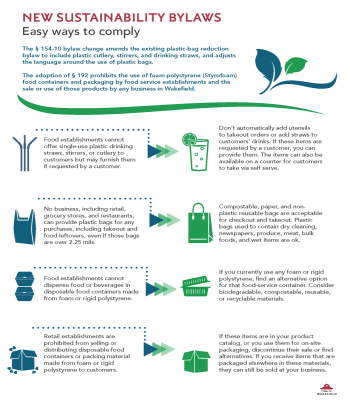Plastics / Styrofoam Bylaw Information
The §154-10 bylaw change amends the existing plastic-bag reduction bylaw to include plastic cutlery, stirrers, and drinking straws, and adjusts the language around the use of plastic bags. Read the bylaw in full.
The adoption of §192 prohibits the use of foam polystyrene (Styrofoam) food containers and packaging by food service establishments and the sale or use of those products by any business in Wakefield. Read the bylaw in full.
Enforcement
Enforcement took effect on January 1, 2022. Please use this form if you find a local business is not in compliance with our plastic reduction (§154-10) and Styrofoam (§192) ban bylaws so that we can assist in bringing them into compliance.
When do these regulations go into effect?
The bylaws went into effect on June 30, 2021.
Why were these bylaws created?
The bylaws have a major environmental and sustainability foundation.
Article 8:
Polystyrene is based on styrene, a neurotoxin and probable carcinogen. It is the only plastic used in food packaging that is based on a carcinogen. Polystyrene food items are a major litter problem, as the foam easily breaks down into small pieces that can escape from the garbage truck, landfill, boat, and average consumer’s hands. These pieces are then carried into lakes and waterways, and eventually into the ocean. Polystyrene also harms wildlife. Foam, in particular, is often mistaken as food by both domesticated and wild animals, thereby entering the food chain. It also does not biodegrade and, although it does fragment through mechanical action and photodegradation in the presence of light, these processes are slow, taking an estimated 200+ years to complete. Polystyrene, which is almost never recycled due to its low value, is made from non-renewable fossil fuels (oil and natural gas).
Article 9:
It has been estimated that by 2050 there will be more plastic in our oceans than there will be fish1. This bylaw helps reduce the amount of plastics consumed in Wakefield which often litter our streets and waterways. Restaurants and other retail establishments are using thicker plastic bags due to a loophole in the original plastic bag bylaw. Article 9 expands the plastic bag ban to include all plastic checkout bags regardless of thickness, and includes food establishments. To further reduce the plastic in Wakefield, this bylaw also limits the automatic distribution of plastic cutlery, stirrers, and drinking straws to upon request only. Plastic bags are infrequently recycled and often disposed of improperly. These bags are often thrown into curbside recycling bins, which creates machinery problems at the recycling plants and contaminates loads. Cutlery, stirrers, and straws cannot be recycled and can be mistaken for food by animals.
Can I provide plastic utensils for my in-store or takeout customers?
Food establishments cannot proactively offer single-use plastic drinking straws, stirrers, or cutlery to dine-in or takeout customers but they can furnish the items if specifically requested by a customer. Simply ask your customers when they order if the plastic items will be needed. Many customers will forego the items, therefore saving you money and the environment from additional waste.
Can single-use plastic drinking straws, stirrers, or cutlery be made available on a counter for customers to take at their leisure?
Yes. These items can be offered as self-serve in your establishment.
Am I required to furnish paper straws?
No. Paper straws are a great way to promote sustainability, but they are not required. If you supply plastic straws, they must be requested by your customer as opposed to automatically provided. Many customers will forego the item, therefore saving you money and the environment from additional waste.
Can I offer plastic bags to my customers?
Plastic bags used to contain dry cleaning, newspapers, produce, meat, bulk foods, wet items, and other similar merchandise, typically without handles, are still permissible. Plastic bags cannot, however, be used for checkout or takeout purposes unless they are compostable.
I receive products already packaged in polystyrene. Can I continue to resell them?
Yes. If your establishment receives eggs in polystyrene cartons, for example, that were processed and packaged at a distribution site outside of Wakefield, you can continue to sell the products. You cannot, however, process and package items onsite in a polystyrene container or tray.
We currently sell direct-to-consumer polystyrene items like coffee cups, plates, packing peanuts, and coolers. Can I continue to sell them?
No. You should discontinue their sale or find alternatives. In the bylaw, “disposable food container” means all food and beverage containers, bowls, plates, trays, cartons, and cups, designed for one-time or non-durable uses, on or in which any food vendor directly places or packages prepared foods on the food provider’s premises or which are used to consume foods. This includes, but is not limited to, food service ware for takeout foods and leftover food from partially consumed meals prepared at food establishments. “Packing material” means polystyrene foam used to hold, cushion, or protect items packed in a container for shipping, transport, or storage. This includes, without limitation, packing “peanuts” and shipping boxes, coolers, ice chests, or similar containers made, in whole or in part, from polystyrene foam that is not wholly encapsulated or encased within a more durable material.
What types of takeout containers should I choose to comply with the polystyrene bylaw?
If your restaurant is currently using polystyrene takeout containers, you will need to find alternatives made from different materials. The Chamber of Commerce or our Office of Community and Economic Development can provide examples of such alternatives if you need guidance.
Will this initiative cost my business more money?
1 The New Plastics Economy, World Economic Forum, January 2016


